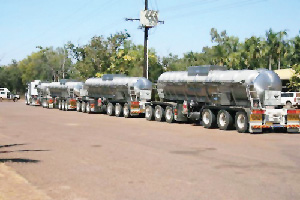
Oil exploration boosts NAMCOR profits
The current wave of oil exploration that has seen two international companies, Chariot Oil and Gas and HRT drill five wells off the coast of Namibia has boosted the National Petroleum Corporation of Namibia’s Group (NAMCOR) profit for the financial year ending March 2013.
NAMCOR’s group operating profit increased by 144% to N$116.7 million attributed mainly to signature bonuses received during the reporting period. A signature bonus is a payment made up front by oil companies to the host country of an oil producing nation for the right to develop a block commercially before work begins.
Although no figures were immediately made available, NAMCOR’s Managing Director Obeth Kandjoze said signature bonuses had positively impacted on the company’s profit. Kandjoze said: “With our partners, and the Ministry of Mines and Energy, we have seen the Exploration and Production division benefiting from the effective marketing of Namibia’s hydrocarbon blocks. This resulted in significant signature bonuses being received contributing positively to the operating profit.”
Figures released by NAMCOR also shows that data sales revenue increased 230% to N$67.3 million during the 2012/13 financial year while fuel sales revenue increased by 86% to N$378.7 million. Including revenue from other operations, total group revenue increased 162% to N$595 million from N$227 million in the prior year.
Net operating income was N$118.3 million in 2013 up by 96% compared to 2012 while group expenses also increased from N$69.9 million in 2012 to N$107.1 million mainly due to significant investments in Kudu and capacity building.
Kandjoze said NAMCOR has acquired more than 120 000 line kilometres of 2D seismic data and more than 24 000 sq. km of 3D seismic data. The company now has interest in 75% of the issued licences both on and off shore Namibia.
While acknowledging the negative impact that the reliance on signature bonuses might have on the company’s bottom line, Kandjoze said despite the dry wells that have been encountered so far, he was positive that the demand for acreage will keep rising which will result in improved earnings from signature bonuses.
He said: “Dry wells are a world-wide phenomena and the industry knows this. But as long as you have tumultuous situations in the global industry, in the supply and demand, and every country jostles to have the first right to supply, dry wells will keep coming, but someone must find oil and someone must be unlucky at finding it. It’s part of the industry.
“So as the demand for acreage rise, there is a commensurate higher income from data services and perhaps signature bonuses.”
However, despite NAMCOR’s improved results, the national petroleum company’s lubricant business launched about three years ago has not really taken off. Kandjoze attributed this to the cut throat competitive nature of the industry which he said involves cartels.
He said: “The challenge is much like in the fuel industry, cartels are at play here and we must break into the market. Further to that, you must take into account that we are not appropriately funded to execute this mandate, this is a hand to mouth business.
“From a funding perspective, you are placed within such a cut throat industry and such well funded opposition, and you are expected to make a difference. How do you go to war without a nuclear weapon or without the appropriate gadgets to protect yourself and win that war or at least rank amongst the fair competitors?”
The NAMCOR MD added that it was extremely important to get back the company’s fuel import mandate. “It is a money making business; in the past we made good money out of it,” he said.
He said while they are unlikely to meet the October deadline that was set by government to show their preparedness to be given back the mandate, he is confident that the company will meet the second deadline set for February next year.









































